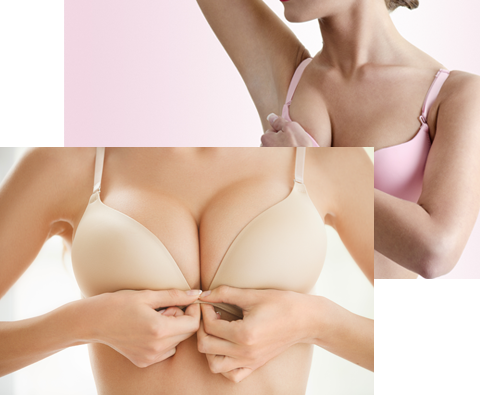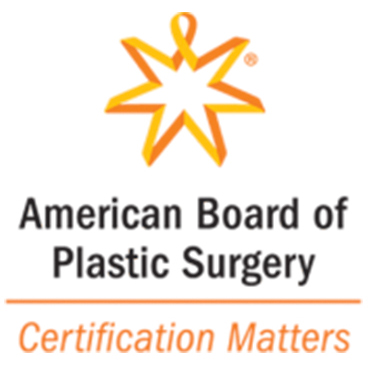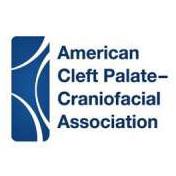Jump To:
Achieve Comfort and Balance with Breast Reduction Surgery
Conveniently located to serve Niagara Falls and Buffalo NY
Also known as reduction mammaplasty
The goal of breast reduction surgery is to reduce the size of your breasts and reshape them so that they are proportionate to the rest of your body and are no longer a source of physical discomfort. This commonly requested, predictable procedure has the dual benefits of improving your appearance while relieving the physical and emotional burden of overly large breasts.
When to Consider Breast Reduction
- If your breasts are too large for your body frame and create neck, back, or shoulder pain
- If you have heavy breasts with nipples and areolas (pigmented skin surrounding the nipples) that point downward
- If one breast is much larger than the other
- If you are unhappy and self-conscious about the large appearance of your breasts

Related Procedures
Many women who consider breast reduction also consider breast lift, liposuction, and mommy makeover.
Important Considerations Before Surgery
PROS:
- Your breasts will be in better proportion with your body and will feel firmer.
- Surgery will alleviate neck, back, and shoulder pain and make it easier to breathe and exercise.
- Your clothes will fit better and you will feel more confident about your appearance.
CONS:
- You may have decreased sensation in some areas, including the nipples and areolas.
- Although incisions are at the lower pole of the breast, some experience excessive scarring.
- Breast-feeding is often not effective.
These are the top three pros and cons to weigh when considering breast reduction. If you want to focus on those specifically unique to you, please consult with your aesthetic plastic surgeon.
Are You a Good Candidate for Breast Reduction?
Women who seek breast reduction often have had children, are overweight, have a predisposition for large, disproportionate breasts, or are sensitive to estrogen. Big breasts often run in a family, inherited from mothers and grandmothers.
Following are some common reasons why you may want to consider breast reduction:
- You have backaches, neck aches, or skin irritation under your breasts.
- You have difficulty breathing and notice grooves in your shoulders from your bra straps.
- You have poor posture or numbness in parts of your breasts and upper chest from excessive breast weight.
- You find it nearly impossible to buy dresses and blouses and difficult to find tops that fit.
What to Expect During Your Breast Reduction Consultation
“A consultation for aesthetic surgery is truly a meeting of the minds — the development of a connection between patient and surgeon. Your job is to tell us what you want; our job is to tell you what’s possible, reasonable, and, above all, safe.
We are privileged to have an outstanding team of medical professionals who are caring, exceptionally talented, and driven to help you look and feel your very best.”
– Robert J. Perry, MD FACS
- You are very unhappy with your appearance because of your breast size.
- You are in good health with no active diseases or pre-existing medical conditions.
- You have realistic expectations of the outcome of your surgery. You must be able to discuss what you want with your plastic surgeon so that you can reach an understanding of what can realistically be achieved.
- Your skin has adequate elasticity, so it can resume its former tightness following surgery.
- You are mentally and emotionally stable. Breast reduction requires patience and stability to deal with the healing period.
- You are old enough so that your breast development has stopped.
- You have finished having children and breast-feeding, because this can have significant and unpredictable effects on the size and shape of your breasts. Nevertheless, many women decide to undergo breast reduction before having children and feel that they can address any subsequent changes later. If you plan to breast-feed in the future, you should discuss this with your plastic surgeon
A history of irregular mammograms, undiagnosed lumps or other types of masses, severe obesity, diabetes, wound healing disorders, current breast-feeding, smoking, clotting disorders or a family history of them, and heart or circulatory disorders are all contraindications for breast reduction.
If you are in good general health and have a positive attitude and realistic expectations, you are most likely a good candidate for this procedure.
Your breast reduction will be performed at an accredited hospital-based or free-standing ambulatory surgery center.
FAQs About Breast Reductiion
Are there risks associated with breast reduction surgery?
Breast reduction surgery has risks like any surgical procedure, including reactions to anesthesia, bleeding, infection, and healing complications. Our breast reduction surgeon at Buffalo Niagara Plastic Surgery will discuss these with you to help you understand all potential outcomes during your consultation.
How should I prepare for breast reduction surgery?
Preparation involves several steps—obtaining medical evaluations, adjusting medications, and quitting smoking. Ask someone to drive you to and from the surgery and stay with you the first night.
How long does recovery take after a breast reduction procedure?
Recovery varies but typically lasts two to six weeks. Most patients return to work within a week or two, avoiding strenuous activities for up to six weeks.
What are the possible side effects of breast reduction surgery?
Common side effects include bruising, swelling, discomfort, and temporary changes in nipple sensation. Our surgeons will guide you in managing these effects.
Will there be scarring after the breast reduction procedure?
Scarring is natural but incisions are usually made in less visible areas. Scars typically fade over time and become less noticeable.
How long will the results of breast reduction last?
The results are generally long-lasting, effectively reducing pain and physical limitations. Aging and weight changes can alter breast size and shape over time.
Will breast reduction affect my ability to breastfeed?
The impact on breastfeeding depends on the surgical technique and the amount of tissue removed. We will discuss future breastfeeding plans to adjust the approach potentially.
How much does breast reduction surgery cost, and is it covered by health insurance?
Costs vary based on several factors, including the surgeon’s fee and facility costs. If the surgery is for medical relief, it may be covered by insurance. We will give you an estimate of these costs during the consultation.









